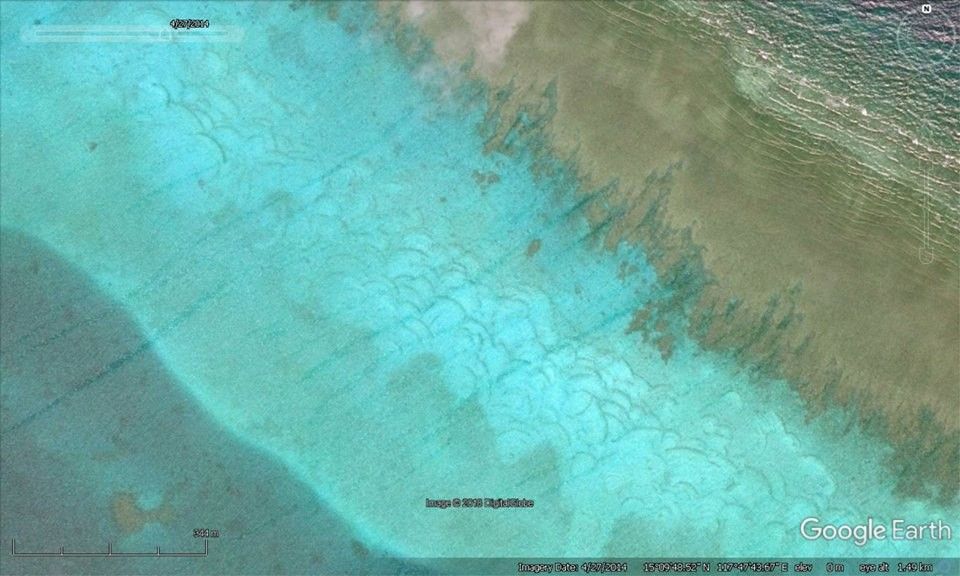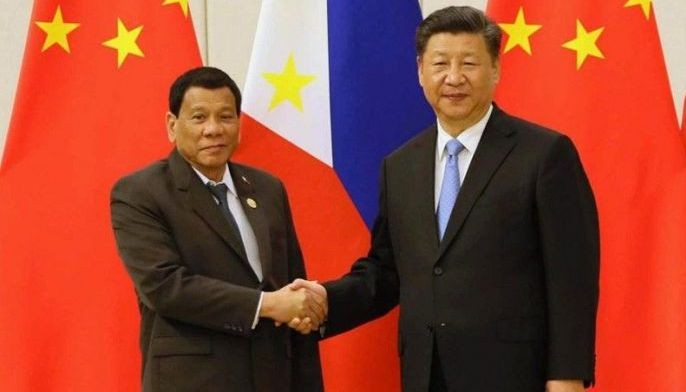Philippines should urge Chinese cooperation in Scarborough rehab, says expert

MANILA, Philippines — The Philippine government should demand that China cooperate in restoring the damaged marine environment of Scarborough Shoal in the West Philippine Sea, a maritime law expert said.
Jay Batongbacal, director of the University of the Philippines Institute for Maritime Affairs and Law of the Sea, suggested that this should be one of the government's actions if it is serious in maintaining a rules-based order at sea.
China could do this by supporting a Philippine-led coral implanting and rehabilitation program to address the massive damage inflicted by Chinese fishermen who have cut up the reef while extracting giant clams in the area.
"Today, China has done nothing to make up for this massive damage even though it has recognized, a bit too late, the need to stop its fishermen from engaging in this destructive behavior," Batongbacal said in a forum organized by independent think tank Stratbase ADR Institute.
The maritime expert noted that more than 550 hectares of damage could be seen from satellite photos.
"Using the valuation of Tubbataha Reef damage in 2013 for example, which was as P24,000 per square kilometer, the damage is at least worth P132 billion," he said, referring to the grounding of USS Guardian, a US Navy minesweeper, in 2013. The US paid the Philippine government around P87 million in compensation for the damage in 2015.
Cooperation between the Philippines and China in rehabilitating Scarborough Shoal would be in line with both countries' commitment under the United Nations Convention on the Law of the Sea and international law.
This initiative, however, would not necessarily entail the direct implementation of the arbitral award issued two years ago.
Joint exploration in uncontested areas
Another action the Philippines could make in addressing the issues in the West Philippine Sea would be lifting the moratorium on petroleum service contracts in the region and proceed with joint exploration in uncontested areas.
"This will also demonstrate the country will not endanger its own economy and energy security," Batongbacal said.
Following Chinese President Xi Jinping's declaration that Beijing has no intention of militarizing the South China Sea, the Philippines should also demand an unequivocal commitment from China to remove weapons on its outposts in the South China Sea, particularly Mischief Reef.
Mischief Reef is within the Philippines' exclusive economic zone and close to the country's territory and airspace.
Two years after the arbitral ruling was released, both the Philippines and China are facing challenges on its positions on the sea dispute.
According to Batongbacal, it is a challenge for China to demonstrate sincerity and self-restraint to "prove that it is not on a path towards aggressive belligerent regional domination."
For the Philippines, it is a challenge for the Duterte administration to "show some spine" on its foreign policy to show that it is looking out for the interest of the Filipino people.
"It should begin with the change in soft and submissive policy and replacing it with a more active and protective one. It does not entail a shift to an aggressive or warmongering tone but merely a more dignified one based on self-respect, equal footing and watching out for our own national interest," Batongbacal said
READ: Philippines now 'willing victim' in South China Sea dispute, Del Rosario laments
Meanwhile, a significant majority of Filipinos share the opinion that the Duterte administration should assert the country's sovereignty in the West Philippine Sea as stipulated in the July 2016 arbitral decision. The latest Pulse Asia survey showed that 73 percent of Filipinos think that the government should assert the arbitral ruling on the contested waterway.
The survey also showed that 36 percent of Filipinos think that the government should file diplomatic protests before the Chinese Embassy to emphasize the landmark ruling that the islands in the West Philippine Sea are within the country's exclusive economic zone. Foreign Affairs Secretary Alan Peter Cayetano previously claimed the Philippines has filed "50-100" of those.
Related video:
Social media users, including former Solicitor General Florin Hilbay, are reporting seeing banners saying "Welcome to the Philippines, Province of China" hanging from overpasses in parts of Metro Manila.
The sightings coincide with the second anniversary of an arbitral tribunal ruling that China's sweeping nine-dash line claim over the South China Sea has no legal basis. The Philippines has opted to play down the ruling and focus on nurturing better political and economic relations with China.
NOT FUNNY.
— florin hilbay (@fthilbay) July 11, 2018
On this day, July 12, we commemorate our victory in Philippines v. China.
On Metro Manila footbridges, these tarps suddenly appear.
MMDA, LGUs, and citizens should immediately take these down. pic.twitter.com/gDR6BMbojI
It is unclear who put up the banners, which are a possible reference to a "joke" that President Rodrigo Duterte told Chinese-Filipino business leaders in February.
"He (Xi) is a man of honor. They can even make us 'Philippines, province of China," we will even avail of services for free," Duterte said in apparent jest. "If China were a woman, I'd woo her."
The Palace said the remark was meant to impress the audience, who were Filipino citizens of Chinese descent.
A week since the seventh anniversary of the historic ruling at The Hague, activist fisherfolk group urges the government to protest the presence of more than 50 Chinese Coast Guard vessels and one "monster ship" in the Ayungin Shoal (Second Thomas Shoal) before the international court.
It says that the swarming of the ships violates the United Nations Convention of the Law of the Sea.
“While the United Nations Convention on the Law of the Sea (UNCLOS) recognizes the freedom of navigation and innocent passage in open seas, a swarm of ships that creates tensions could be deemed illegal," Pambansang Lakas ng Kilusang Mamamalakaya ng Pilipinas (PAMALAKAYA) says.
"We urge the Marcos administration to protest and ultimately expel the overwhelming presence of Chinese Coast Guard vessels in our territorial waters. Their presence is a blatant display of military might to assert Beijing’s unjust claim in the West Philippine Sea. President Marcos could raise this recent swarming incident to the United Nations and reassert our sovereign rights upheld by the UNCLOS and other rules of international law," it adds.
A week before the seventh anniversary of the arbitral ruling on the South China Sea, fishers are seeking a stronger assertion of national sovereignty.
In a release, activist fisherfolk group Pambansang Lakas ng Kilusang Mamamalakaya ng Pilipinas (PAMALAKAYA) urges the Marcos administration to “have a stronger action to assert our sovereign rights to China using the arbitral award.”
It stressed that it has been seven years since the Philippines won in the Permanent Court of Arbitration but the Chinese military facilities on seven artificial islands on the Spratlys island remain. It also cited more than 200 Chinese vessels and boats are still regularly patrolling in our territory.
PAMALAKAYA chair Fernando Hicap says President Marcos Jr. should be alarmed over the long-term impact of these actions in the fish production in the country and demanded swift action to protect Filipino fishermen from aggression.
Days after the anniversary of the historic 2016 Hague ruling, China insists the 2016 Hague ruling is "illegal, null and void."
Chinese Foreign Ministry Spokesperson Wang Wenbin says: "The so-called award of the South China Sea arbitration seriously violates international law including the UNCLOS."
The ruling invalidates China's nine-dash claims over the South China Sea. However, Wang says: "China neither accepts nor recognizes it and will never accept any claim or action based on the award." — Kaycee Valmonte
The United States reaffirms its commitment to the Philippines on the sixth anniversary of the Hague tribunal ruling.
Secretary of State Antony Blinken says it also reaffirms “that an armed attack on Philippine armed forces, public vessels, or aircraft in the South China sea would invoke U.S. mutual defense commitments under Article IV of the 1951 U.S.-Philippines Mutual Defense Treaty.”
Blinken tthen calls on the People’s Republic of China to “abide by its obligations under international law and cease its provocative behavior.”
“We will continue to work with allies and partners, as well as regional institutions like ASEAN, to protect and preserve the rules-based order.” — Kristine Joy Patag with Kaycee Valmonte
The United States reaffirms its commitment to the Philippines on the sixth anniversary of the Hague tribunal ruling.
— Kaycee Valmonte (@kayceevalmonte) July 12, 2022
The US also calls on China to abide by obligations under international law and "cease its provocative behavior" @PhilstarNews pic.twitter.com/mPLRwBGiQU
Foreign Affairs Secretary Enrique Manalo says July 12, 2016 is remembered as “the day the that affirmed to the community of nations that the rule of law prevails, and that stability, peace and progress can only be attained on a rules-based legal order on the oceans, as it should be everywhere else.”
He adds the award “not only sets reason and right in the South China Sea, but is an inspiration for how matters should be considered—through reason and right—by states facing similarly challenging circumstances.”
Manalo stresses that the findings are conclusive and indisputable, and the award is final.
“We firmly reject attempts to undermine it; nay, even erase it from law, history, and our collective memories. At the same time we welcome the support of a growing list of countries for the Award.” — Kristine Joy Patag
- Latest
- Trending




























